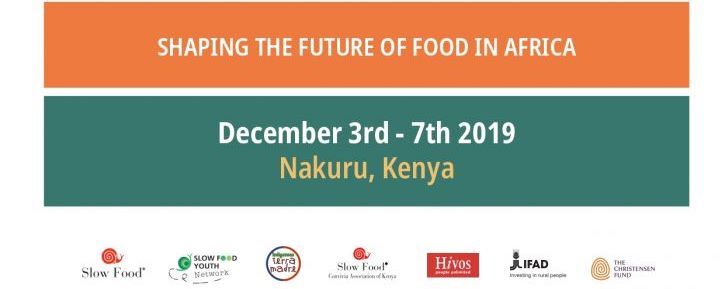From December 3rd–7th, delegates from Kenya, Uganda, Tanzania, the Democratic Republic of Congo, Zambia, Malawi and South Africa will gather in Nakuru, Kenya, to participate in the event “Shaping the future of food system in Africa”. Delegates are members of the Indigenous Terra Madre (ITM) network, the Slow Food Youth Network (SFYN), as well as the Hivos Sustainable Diets for All (SD4All) program.
“Shaping the future of food system in Africa” is a five-day training event to allow the young delegates to acquire the tools necessary to protect and promote their food heritage, learn how to engage in policy and decision-making processes and turn their plans into action.
During the training, delegates will work on a common Action Plan to be presented to local and international institutions at a public event to be held on the last day, December seventh. Feedback received from these institutions will help to create synergies and common agendas so that the project may be pitched to interested parties.
For four days, delegates will attend capacity-building workshops and networking events as young SFYN food leaders, both indigenous and not,” states Valentina Gritti of the Slow Food Youth Network. “In addition to developing Action Plans pushing for change in the African food system, they’ll celebrate raising awareness and appreciation for traditional products and crafts. The event will be an opportunity to discuss and share their approaches towards healthy diets, land rights, agroecology, seeds and gender in agriculture.”
“This event is an important milestone in the Road Map towards 2020 set up by Indigenous Terra Madre network in Kenya,” affirms Maasai Tunda Lepore, a member of the ITM Advisory Board. “Youth involvement is paramount for the continuity of the fight against harmful food production and other related challenges. It’s fundamental that younger generations and indigenous peoples have opportunities to confront and share their knowledge and skills in addressing global challenges like climate crisis and hunger. We, indigenous and non -indigenous youth, need to be allies on this. We need to make our voices heard and do it in a more strategic way, and that’s what this event is about.”
The event will bring together young and indigenous delegates from Kenya, Uganda, Tanzania, the Democratic Republic of Congo, Zambia, Malawi and South Africa.
Delegates will gain hands-on experience through field trips showing how local communities deal with specific issues, such as seeds, land rights and agroecology: they will visit the Seed Savers Network Kenya, the Ogiek Honey and Mau Forest Dried Nettles Slow Food Presidia and the Slow Food Karirikani Community Garden.
The highlight at the end of the week will be the Indigenous Terra Madre event with conferences and workshops open to the public. Conferences will focus on the climate crisis and indigenous food systems, as well as protecting food culture and biodiversity through Slow Food’s Ark of Taste project.
“Shaping the future of food in Africa” is supported by the SD4All program, implemented by Hivos and IIED, and funded by the Dutch Ministry of Foreign Affairs. The event builds on the ongoing collaboration between Hivos and Slow Food in the UN One Planet Network Sustainable Food Systems (SFS) Program, and on the long-term partnership that Slow Food has with The Christensen Fund and the International Fund for Agricultural Development (IFAD), for the strengthening of the Indigenous Terra Madre network.




